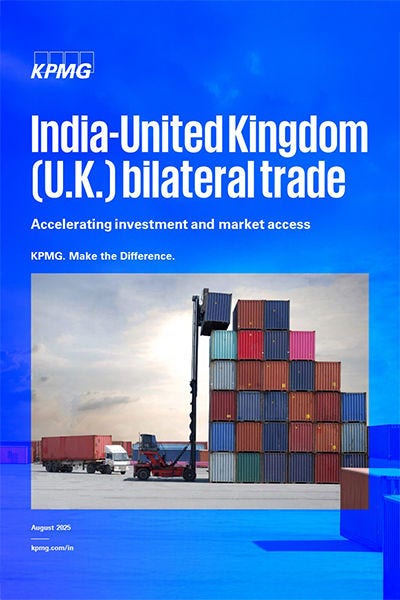India and the United Kingdom (U.K.) formally signed the Comprehensive Economic and Trade Agreement (CETA) on 24 July 2025, following the successful conclusion of trade negotiations earlier this May. The deal marks a defining moment in the evolution of bilateral economic relations, setting the stage for a new era of strategic collaboration, inclusive growth and shared prosperity. Anchored in mutual ambition, the agreement unlocks high-impact opportunities across trade, investment, innovation and job creation. It strengthens economic ties between the two nations through major tariff reductions across sectors and products and broader market access. The reduced duties are expected to boost bilateral trade, valued at around USD56 billion, with a shared goal to double it by 2030.
The agreement grants India duty-free access for 99 per cent of its exports to the U.K., covering nearly the entire trade value. It benefits key sectors such as textiles, leather, marine products, gems and jewellery and toys, alongside high-growth industries, including engineering goods, chemicals and automotive components. Notably, tariffs on U.K. goods, including alcoholic beverages such as whisky and gin, automotive, electric machinery and aerospace are significantly reduced, with duties on spirits dropping from 150 to 75 per cent immediately and to 40 per cent over the next decade. The agreement also delivers a significant boost to the services sector, a key pillar of both economies. It enhances mobility through simplified visa procedures for professionals and provides enhanced access for Indian service providers, particularly in areas such as IT, finance and consulting. Joint initiatives in digital trade and innovation further strengthen this collaboration, enabling the co-creation of advanced solutions and tech-driven services. Moreover, the pact supports the growth of micro, small and medium enterprises (MSMEs) by reducing tariffs on advanced manufacturing equipment, streamlining regulatory frameworks and fostering cross-border partnerships. It also introduces an MSME contact point in both countries to streamline cooperation, enable paperless trade and digital systems and elevate the global profile of Indian products. This initiative opens new avenues for artisans, women-led enterprises and small-scale manufacturers.
The long-term economic impact of CETA is both strategic and transformative. It moves beyond tariff elimination to establish a forward-looking framework for cooperation in trade, innovation and responsible business practices. Businesses are expected to benefit from enhanced digital connectivity, improved market access and stronger supply chains, driving inclusive and resilient growth across sectors. Anchored in shared democratic values, Vision 2035 reaffirms the commitment of both nations to elevate their partnership from transactional engagement to a dynamic alliance. CETA is more than a trade agreement; it is a catalyst for enduring prosperity and a blueprint for future collaboration between India and the U.K.
India-United Kingdom (U.K.) bilateral trade
An overview of the evolving India–U.K. trade partnership driven by mutual interests in services and innovation, strengthened by the recent trade pact

How can KPMG in India help
Key Contact
Access our latest insights on Apple or Android devices





